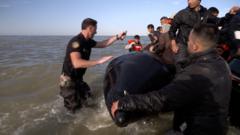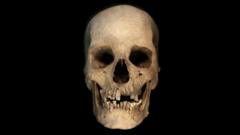This visit marks a significant attempt to re-establish the partnership between the two nations after a turbulent political period, particularly post-Brexit, highlighting the importance of royal engagement in modern diplomacy.
**Reinforcing Franco-British Bonds: King Charles' Role in Diplomatic Revival**

**Reinforcing Franco-British Bonds: King Charles' Role in Diplomatic Revival**
King Charles III’s upcoming state visit aims to mend diplomatic ties between the UK and France, showcasing royal tradition alongside pressing contemporary issues.
The article text:
The upcoming state visit of King Charles III, along with Emmanuel and Brigitte Macron, represents a pivotal moment in UK-France relations. This marks the first visit by a French president since 2008 and the first by an EU leader since Brexit, underscoring its importance amid uncertainty in Europe. As pomp and tradition fill the air with royal processions and a state banquet at Windsor, the visit promises more than ceremonial grandeur; it is infused with the promise of real diplomatic progress.
Both leaders are expected to foster discussions on mutual interests such as defense strategies and the pressing issue of irregular migration, culminating in a UK-France summit co-chaired by Charles and Macron. This summit aims to alleviate residual tensions stemming from Brexit and forge a path toward stronger bilateral cooperation in defense and humanitarian efforts, especially for Ukraine.
Royal engagement has historically played a crucial role in Franco-British relations, and King Charles, a seasoned diplomat with a long-standing appreciation for French culture, is believed to be more than just a symbolic figure. The King’s involvement acts as a bridge, helping to galvanize joint efforts amid broader geopolitical challenges, including shared concerns over Russia and international security.
The backdrop of this significant visit, less than two months after the UK and EU's recent efforts to reset relations, is marked by evolving strategic necessities that call for enhanced collaboration on defense and migration, key areas of focus during the discussions. Notably, the two countries are exploring updates to their existing defense pact and deliberating potential agreements surrounding the management of migration across the English Channel.
The fragile state of relations has been shaped by previous disagreements, notably during Brexit negotiations and the AUKUS deal fallout, suggesting that mistrust remains a challenge. Nevertheless, there is an emerging consensus about the necessity of rebuilding trust, particularly in light of global threats and the humanitarian crisis in Ukraine.
With Macron's political standing shaky domestically, this visit could provide a platform for renewed support on the international stage, tying it to his legacy in Europe. However, migration remains a particularly contentious topic; both nations are under pressure to negotiate workable solutions to illegal crossings, with ongoing discussions about a potential "one-in, one-out" agreement regarding asylum seekers.
Ultimately, this visit carries significant potential to not only strengthen Franco-British ties but also reflect a mutual understanding that transcends historical grievances, signaling a commitment to cooperation and shared goals in a changing world. King Charles' candid call for a renewed friendship highlights the essential role royal diplomacy may play in navigating the complexities of modern international relations, inviting both nations to collectively face the challenges of the 21st century.
The upcoming state visit of King Charles III, along with Emmanuel and Brigitte Macron, represents a pivotal moment in UK-France relations. This marks the first visit by a French president since 2008 and the first by an EU leader since Brexit, underscoring its importance amid uncertainty in Europe. As pomp and tradition fill the air with royal processions and a state banquet at Windsor, the visit promises more than ceremonial grandeur; it is infused with the promise of real diplomatic progress.
Both leaders are expected to foster discussions on mutual interests such as defense strategies and the pressing issue of irregular migration, culminating in a UK-France summit co-chaired by Charles and Macron. This summit aims to alleviate residual tensions stemming from Brexit and forge a path toward stronger bilateral cooperation in defense and humanitarian efforts, especially for Ukraine.
Royal engagement has historically played a crucial role in Franco-British relations, and King Charles, a seasoned diplomat with a long-standing appreciation for French culture, is believed to be more than just a symbolic figure. The King’s involvement acts as a bridge, helping to galvanize joint efforts amid broader geopolitical challenges, including shared concerns over Russia and international security.
The backdrop of this significant visit, less than two months after the UK and EU's recent efforts to reset relations, is marked by evolving strategic necessities that call for enhanced collaboration on defense and migration, key areas of focus during the discussions. Notably, the two countries are exploring updates to their existing defense pact and deliberating potential agreements surrounding the management of migration across the English Channel.
The fragile state of relations has been shaped by previous disagreements, notably during Brexit negotiations and the AUKUS deal fallout, suggesting that mistrust remains a challenge. Nevertheless, there is an emerging consensus about the necessity of rebuilding trust, particularly in light of global threats and the humanitarian crisis in Ukraine.
With Macron's political standing shaky domestically, this visit could provide a platform for renewed support on the international stage, tying it to his legacy in Europe. However, migration remains a particularly contentious topic; both nations are under pressure to negotiate workable solutions to illegal crossings, with ongoing discussions about a potential "one-in, one-out" agreement regarding asylum seekers.
Ultimately, this visit carries significant potential to not only strengthen Franco-British ties but also reflect a mutual understanding that transcends historical grievances, signaling a commitment to cooperation and shared goals in a changing world. King Charles' candid call for a renewed friendship highlights the essential role royal diplomacy may play in navigating the complexities of modern international relations, inviting both nations to collectively face the challenges of the 21st century.




















